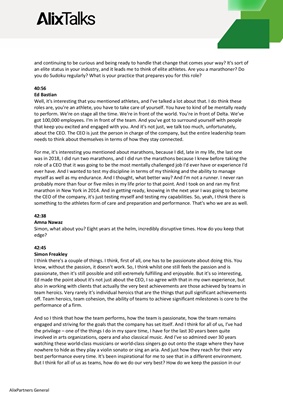
"Does AlixPartners see companies looking to have an AI ethics officer like IBM has done?" Is that
something you see companies putting into place?
37:49
Michael Kratsios
As I have talked to a number of our customers, there are a variety of approaches that they're taking
in order to evaluate these AI use cases. So, IBM and I think Microsoft and others have taken sort of
this almost council-type policy approach where there's a group of senior leaders, some of them are
deeply technical, some are more sort of like legal in the ethics domain, and some are in the business
domain, and all them together can make important decisions about where and when to utilize these
models. For very large companies like that, they're deploying lots of models at very large scale, so
that type of structure probably works. I think, for small organizations or for ones that are just
dabbling with AI, I think they can potentially grow into that. And back to the ethics officer, I think
within the legal domain of a lot of these companies, we're seeing those roles pop up. At least we are.
I don't know what you're seeing, Simon?
38:47
Simon Freakley
I completely agree with you. And I think ultimately, absolutely every major corporation will have to
have somebody fulfilling that responsibility. And of course, there are different standards, and it's not
just about meeting the lowest standards. So, there are legal and regulatory requirements. But I think
your question goes beyond that as to what are the ethics that should govern how data is amassed
and synthesized? How is that ethical test applied to the values of the corporation? Of course, as we
know, for all of our stakeholders, particularly our employees, but also our customers, our lenders,
our investors, the values, the purpose of an organization is key. And so, being able to demonstrate in
this particular dimension that the ethics of an organization, by reference to its values, make sure
that data is both aggregated and then used in an ethical way is going to be critical. So, in the same
way that we see in certain Western economies, chief money laundering officers or chief diversity
officers or chief information security officers, I think we're absolutely going to see people in this role,
and I think it'll be a very important role.
39:55
Amna Nawaz
Simon, that's fascinating to hear you say that. You think every big company will have to have
someone in this role to oversee this, is that right?
40:02
Simon Freakley
I absolutely do. I think it'll be not just to meet regulatory and legal requirements, which is the
threshold requirement, but to be able to demonstrate to stakeholders this is something that the
corporation takes seriously and is focused on, and the appropriate reporting structure is in place so
that somebody fulfilling that responsibility can escalate to certainly the chief executive and probably
the board very readily if they fear that information is being aggregated, synthesized, or used in a way
that isn't consistent with the firm's values.
40:36
Amna Nawaz
So, this actually gets to another audience question coming in that I'll put first to you, Simon, and